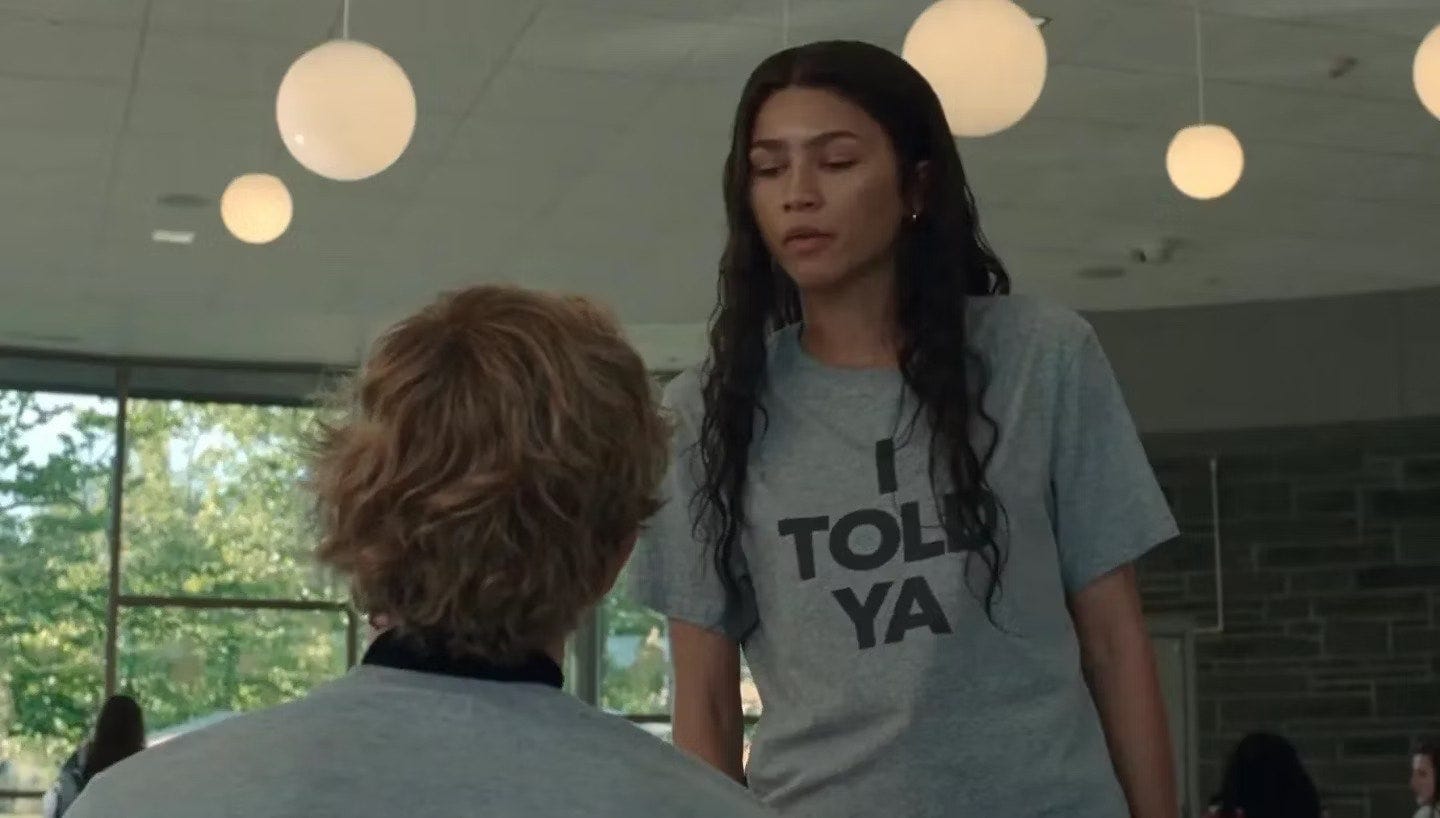Tashi Duncan is a former junior tennis sensation and the sharpest angle of a very intense love triangle in Luca Guadagnino’s movie Challengers, out in theaters now. Brad Gilbert is a former professional tennis player turned coach, and author of Winning Ugly: Mental Warfare In Tennis. One is a fictional character played by international superstar Zendaya, the other is a very real human whose voice you may hear on ESPN during the US Open. They both like winning. And they crossed paths when Brad Gilbert was hired by Guadagnino as a consultant on the film to teach the actors how to convincingly look like tennis players. So he took Zendaya, along with co-stars Mike Faist and Josh O’Connor, through a 7 week boot camp to learn how to hold a racket and hit a backhand.
Most interestingly, in the course of the movie, as Tashi Duncan becomes a full time tennis coach, she inadvertently sets up the perfect framework for a possible follow-up to Gilbert’s best-seller: Coaching Ugly: A Formula for Ruining Your Coachee’s Chances of Success.
In the recent past Corporate America has seen the rise of the Manager-Coach, the leader that not only sets the pace for the team but also encourages the team to shape their own race. And while this archetype is both real - great examples of this sort of leader come to mind - and aspirational - every manager should strive to coach more and say less - Tashi Duncan is the perfect embodiment, in Chanel espadrilles and Ray-Ban sunglasses, of the principal-agent problem, the conflict of interest that is bound to happen when the presumably selfless agent lets their own priorities dictate the agenda for their client. Assuming you can handle spoilers as well as romantic drama, a few plot twists and lines from the script can elucidate this theory.
«What makes you think I want someone to be in love with me?» - Tashi quits tennis before turning pro due to an injury and Art, the athlete with a confidence problem played by Faist, asks her right away to be her coach. He does not deny he is in love with her and she speeds through all the red flags to accept the gig. In a matter of a couple of flashforwards, they are husband and wife. Caring for the success of your coachee is a key element of the coaching process, but marrying into the success of your coachee - even if just metaphorically - is the fastest way to losing perspective and meddling priorities. Countless are the Managers that get involved beyond reason with the advancement of a direct report. A true Coach is someone who can detach themselves emotionally from their team members' decisions and focus solely on guiding them toward success.
«Unfortunately my only skill in life is hitting a ball with a racket» reflects Tashi’s identity as a competitor. Unlike Art, who possesses the physical form but not the mindset of a champion, and Patrick, portrayed by O’Connor, who has the talent but lacks discipline, Tashi stands out as the epitome of competitive spirit. Yet, as she transitions to a coaching role, Tashi struggles to distance herself from the game. Forced to observe from the sidelines and confronted with the limitations of those around her, she finds herself living the sport vicariously, perched on a pedestal. A proficient coach functions as a behavior scientist, objectively evaluating actions and outcomes without judgment. In contrast, an ineffective coach assumes the role of a behavioral judge, attaching value and withholding approval based on individuals’ decisions and achievements.
«I’m taking such good care of my little white boys» - as Tashi evolves from sports agent to chaos agent, she manipulates her husband and her former friend, leveraging their friendship against one another to consolidate power. While her puppeteering can be captivating on screen, it certainly does not make her an exemplary coach. Employing such tactics to control or gain advantage over one's team members is not only shortsighted but also detrimental to overall team cohesion and performance. Managers who prioritize personal gain over team dynamics ultimately undermine the success of the entire team.
«Tell me it doesn’t matter if I win tomorrow» «No» - as his career progresses and wanes, Art increasingly relies on Tashi’s validation, a common scenario in work relationships. Manager-Coaches must delicately navigate the fine line between offering support and wielding authority over their coachee’s sense of affirmation. While achieving this balance may seem daunting, skilled coaches adeptly guide their coachees in discerning the most suitable sources of confidence, empowering them to detach from external validation and cultivate self-assurance independently.
«You want my best piece of advice for you? You want me to coach you? Okay. Quit!» - Tashi’s pivotal flaw is having her eyes on the prize rather than on the person. As a coach, she fixates on greatness, demanding unwavering commitment from those around her and showing little patience for divergent decisions. Her respect becomes contingent upon the effort put in, leading swiftly and unforgivingly to resentment if her expectations are not met. Manager-Coaches should not coddle their teams or condone easily giving up, but they must also avoid tunnel vision, recognizing that success encompasses more than a singular pathway. Effective coaching entails fostering resilience while remaining adaptable to diverse routes to achievement.
A Manager-Coach should listen and not tell
«It’s a relationship» - Tashi's insight that tennis, much like coaching, is a relationship is astute. Both require a nuanced understanding, tailored to specific individuals, contexts and moments. Despite her shortcomings, Tashi's brief tennis career serves as inspiration, showcasing glimpses of her potential as a coach. With the right guidance and training, she has the capacity to evolve into an exceptional coach, capable of guiding athletes towards their full potential.
While Tashi’s journey on the tennis court may be fictional, the lessons it offers are all too real. Aspiring leaders can glean valuable insights from her missteps, learning the importance of maintaining boundaries, fostering a supportive environment, and prioritizing the well-being of their team members above personal agendas. By embodying empathy, adaptability, and a genuine commitment to their team's success, Manager Coaches can navigate the complexities of leadership with grace and effectiveness, ensuring that their coaching style elevates rather than undermines their team's potential.







